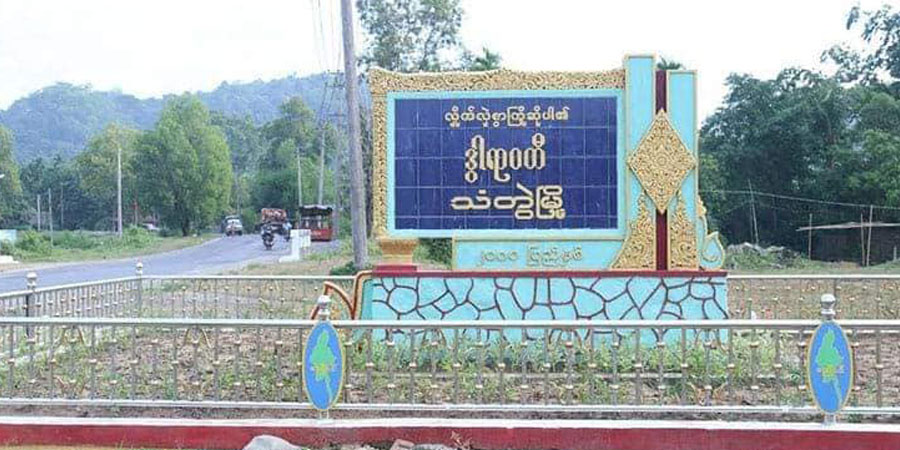သတင်း

သံတွဲတွင် တိုက်ပွဲပြင်းထန်၊ ဒေသခံ ၄,၀၀၀ ကျော် ထွက်ပြေး
April 26, 2024
ရခိုင်ပြည်နယ်၊ သံတွဲမြို့နယ်အတွင်းမှာ ရက္ခိုင့်တပ်တော် (AA) နဲ့ စစ်ကောင်စီတို့ကြား ဧပြီ ၂၆ ရက် မနက်က တိုက်ပွဲပြင်းထန်နေပြီး စစ်ကောင်စီဘက်က ရေတပ်က လက်နက်ကြီးပစ်ကူတွေနဲ့ ပြင်းပြင်းထန်ထန် ခုခံနေတယ်လို့ …
မိုးမောက် ဘာသာရေးအဆောက်အုံများ၌ စစ်တပ်ကတပ်စွဲ၊ တိုက်ပွဲကြောင့် မြို့လုံးကျွတ်နီးပါး ထွက်ပြေးနေရ
April 26, 2024
ဒုချုပ်စိုးဝင်း ဘယ်ရောက်နေလဲ တပ်တွင်းအရာရှိများကြား မေးခွန်းထုတ်
April 26, 2024
မြင်းခြံ ရဲစခန်း၊ နွားထိုးကြီးနှင့် လောင်းလုံးမြို့နယ်တို့တွင် စစ်ကောင်စီတပ်များ တိုက်ခိုက်ခံရ
April 26, 2024
စစ်တပ်ဗုံးကြဲမှုနှင့်စစ်ကျန်လက်နက်ကြောင့် ဆင်ဘို၊ကျောက်ကြီးနှင့်ရေဇွာတို့တွင် ပြည်သူ ၄ ဦးသေဆုံး
April 26, 2024
အားကစား
စပါးနှင့်ကန်မည့်ပွဲ၌ လီဗာပူးပရိသတ် VAR ဒိုင်ကို တာဝန်ပေးမှု အာဆင်နယ်ပရိသတ်ဝေဖန်
DVB
·
April 26, 2024
စပါးအသင်းနဲ့ ကန်မယ့်ပွဲစဉ်မှာ လီဗာပူးပရိသတ်ဖြစ်တဲ့ VAR ဒိုင်ကို တာဝန်ပေးခဲ့တဲ့အပေါ် အာဆင်နယ်ပရိသတ်တွေက မကျေမနပ်ဖြစ်နေကြပါတယ်။
အာဆင်နယ်ဟာ အခုနှစ်ဘောလုံးရာသီရဲ့ အဆုံးအဖြတ်ပွဲစဉ်အဖြစ် တနင်္ဂနွေနေ့မှာ…
ဘာစီလိုနာကနေ ထွက်ခွာမည့် ဆုံးဖြတ်ချက်ကို နည်းပြဇာဗီ ပြန်လည်စဉ်းစားမည်
DVB
·
April 25, 2024
လီဗာပူး၏ ပရီးမီးယားလိဂ်ချန်ပီယံမျှော်လင့်ချက် ပြီးဆုံးသွားပြီဟု ကာရေဂါသုံးသပ်
DVB
·
April 25, 2024
ပါရီအိုလံပစ် မီးရှူးတိုင်ကို ပြင်သစ်နိုင်ငံတဝန်း၌ ၆၈ ရက်ကြာ လှည့်လည်မည်
DVB
·
April 24, 2024
Laureus ကမ္ဘာ့အားကစားသမားဆုကို ဘွန်မာတီနှင့် ဂျိုကိုဗစ်တို့ ဆွတ်ခူး
DVB
·
April 24, 2024
ချန်ပီယံပြေးလမ်း၌ အသင်းအားလုံးခြေချော်နိုင်ဟု နည်းပြဂွါဒီယိုလာပြော
DVB
·
April 26, 2024
ချန်ပီယံပြေးလမ်းမှာ မန်စီးတီးအပါအဝင် အသင်းအားလုံးခြေချော်နိုင်သေးတယ်လို့ နည်းပြ ပတ်ဂွါဒီယိုလာက ပြောပါတယ်။
ဧပြီ ၂၆ ရက်မနက်က ကစားခဲ့တဲ့ ဘရိုက်တန်နဲ့ပွဲမှာ မန်စီးတီးက ၄ ဂိုး ဂိုးမရှိနဲ့ အနိုင်ရခဲ့ပြီ…
အက်စတန်ဗီလာနှင့် ၃ နှစ် စာချုပ်သက်တမ်းတိုးရန် နည်းပြအူနိုင်းအမ်မရီသဘောတူ
DVB
·
April 24, 2024
အန်တိုနီအနေဖြင့် ရန်စသည့်အောင်ပွဲခံမှု မလုပ်သင့်ဟု မန်ယူနည်းပြတန်ဟတ်ဂ် ပြော
DVB
·
April 24, 2024
နည်းပြတန်ဟတ်ဂ်ကို ထုတ်ပယ်ရန် မန်ယူအသင်းဆုံးဖြတ်ပြီးဟု အလန်ရှီးယားသုံးသပ်
DVB
·
April 23, 2024
အေစီမီလန်ကိုအနိုင်ယူပြီး အင်တာမီလန်အသင်း အီတလီစီးရီးအေချန်ပီယံဆုရ
DVB
·
April 23, 2024
အင်တာဗျူး
“နယ်မြေကို ထိန်းချုပ်ထားနိုင်စွမ်းကတော့ ၈၅ ရာခိုင်နှုန်း ရှိပြီ” - ကရင်နီ KSCC ဥက္ကဋ္ဌ
April 25, 2024
“တွေ့ရာသင်္ချိုင်း ဓားမဆိုင်း ကျုံးထည့်ရမှာပဲ၊ ဒီတခါတော့ သည်းညည်းမခံနိုင်တော့ဘူး” KNU ပြောခွင့်ရ ပဒိုစောတောနီး
April 24, 2024
“တော်လှန်ရေးကနေထွက်ပေါ်လာတဲ့ သီချင်းတွေတချိန်မှာ ပြန်လည် မီးမောင်းထိုးပြနေမယ်” အဆိုတော် ဒေးဗစ်လိုင် (ရုပ်သံ)
April 24, 2024
နိုင်ငံတကာ

အမေရိကန်တက္ကသိုလ်ကြီးများတွင် ဂါဇာစစ်ပွဲဆန့်ကျင်ရေး စခန်းချဆန္ဒပြမှုများ နှိမ်နင်းခံရ
April 26, 2024
နာမည်ကျော် ကိုလံဘီယာတက္ကသိုလ်က စတင်ခဲ့တဲ့ ဂါဇာစစ်ပွဲဆန့်ကျင်ရေး စခန်းချ တဲထိုးဆန္ဒပြုမှုတွေ အမေရိကန်နိုင်ငံတဝန်းက တက္ကသိုလ်ကြီးတွေမှာ ပျံ့နှံ့လာခဲ့ပြီးနောက် အမြစ်မတွယ်မီ အာဏာပိုင်တွေက အလျင်အမြန် ရှင်…
အိန္ဒိယလွှတ်တော်ရွေးကောက်ပွဲ ဒုတိယပိုင်းမဲပေးမှု စတင်
April 26, 2024
ရုရှားကို အားပေးကူညီမှု ရပ်တန့်ရန် တရုတ်ကို နေတိုးအကြီးအကဲ သတိပေး
April 26, 2024
ကိုလံဘီယာစစ်တပ်၏ စစ်ဆင်ရေးအတွင်း သူပုန် ၁၅ ဦးထက်မနည်း သေဆုံး
April 26, 2024
ပေါ်တူဂီတွင် ဖက်စစ်အာဏာရှင်ကို ဖြုတ်ချခဲ့သည့် နှစ် ၅၀ ပြည့် အခမ်းအနား ကျင်းပ
April 26, 2024
ကာတွန်း
ဆောင်းပါး
ရာသီဥတုပြောင်းလဲမှုနှင့် ဘယ်လ်ဂျီယံရိုးရာ မြင်းစီးငါးဖမ်းသမားများ
April 26, 2024
ဘယ်လ်ဂျီယံရိုးရာ မြင်းစီး ငါးဖမ်းသမားတွေဟာ ရာသီဥတုပြောင်းလဲနေမှုကို သူတို့ရဲ့ ပိုက်ကွန်တွေထဲမှာ အထင်းသားတွေ့မြင်ကြရပါတယ်။
ဘယ်လ်ဂျီယံနိုင်ငံ အနောက်ဘက်စွန်းကမ်းရိုးတန်းက အေးချမ်းတဲ့ ရာသီရက်မှာ ပုစွန…
ခရီးဆောင်အိတ်များနဲ့ လေဆိပ်ထဲက လူငယ်တွေ
April 25, 2024
ခရီးသွားသူနဲ့ ခရီးဆောင်အိတ်ဆိုတာ လမ်းခရီးတခုမှာ ဖယ်ခွာလို့မရတဲ့ မိတ်ဆွေတွေ ဖြစ်ကြတယ်။ ကိုင်းကျွန်းမီ ကျွန်းကိုင်းမီတဲ့သဘော။ ခေါ်ဆောင်ရာနောက်ကို အသံမထွက်ဘဲ တိတ်တဆိတ် လိုက်ပါလာသူဖြစ်တယ်။ သွားမယ်၊ လာမယ…
ချန်ပီယံ ကြင်စိုး (သရော်စာ)
April 25, 2024
(က)
“ဟေ့ ဟေ့ လေ အဘ
ဟေ့ ဟေ့ လေ အဘ . . .
လေအဘတပ် ပြေးပုံများက
အမျိုးစုံပါကွယ် . . .”
“သင်္ကြန်ပြီးသွားပြီဟ မူးသာရ၊ မင်းမလည်း သင်္ကြန်သီချင်း ဆိုလို့ကောင်းတုန်း”
အဘလှဘူးက ပြောတော့ စိမ…
ဒေါ်အောင်ဆန်းစုကြည်ကို စစ်ကောင်စီ ဘာကြောင့် ပြောင်းရွှေ့ချုပ်နှောင်ထားလဲ
April 24, 2024
အာဏာသိမ်းပြီးချိန်ကတည်းက ၃ နှစ်ကျော် စစ်တပ်က ဖမ်းဆီးထိန်းသိမ်းခံထားရတဲ့ နိုင်ငံတော်အတိုင်ပင်ခံပုဂ္ဂိုလ် ဒေါ်အောင်ဆန်းစုကြည်နဲ့ သမ္မတ ဦးဝင်းမြင့်တို့ကို ပြီးခဲ့တဲ့ ဧပြီ ၁၇ ရက်မှာပဲ အကျဉ်းထောင်ထဲက ခေါ်…
ပြည်ပထွက်လိုအား များနေချိန် ပတ်စ်ပို့ပေ့ချ်အတုတွေ သတိထား
April 24, 2024
လက်ရှိကာလ မြန်မာနိုင်ငံတွင်းကနေ လူငယ်လူရွယ်တွေ ပြည်ပထွက်လိုအား များလာနေချိန်မှာ အွန်လိုင်းလူမှုကွန်ရက်ပေါ်မှာလည်း Passport ပေ့ချ် စာမျက်နှာအတုတွေ အချိန်ကိုက် ပွားများလာနေတဲ့အကြောင်းကို သတိပေး ပြောကြာ…

